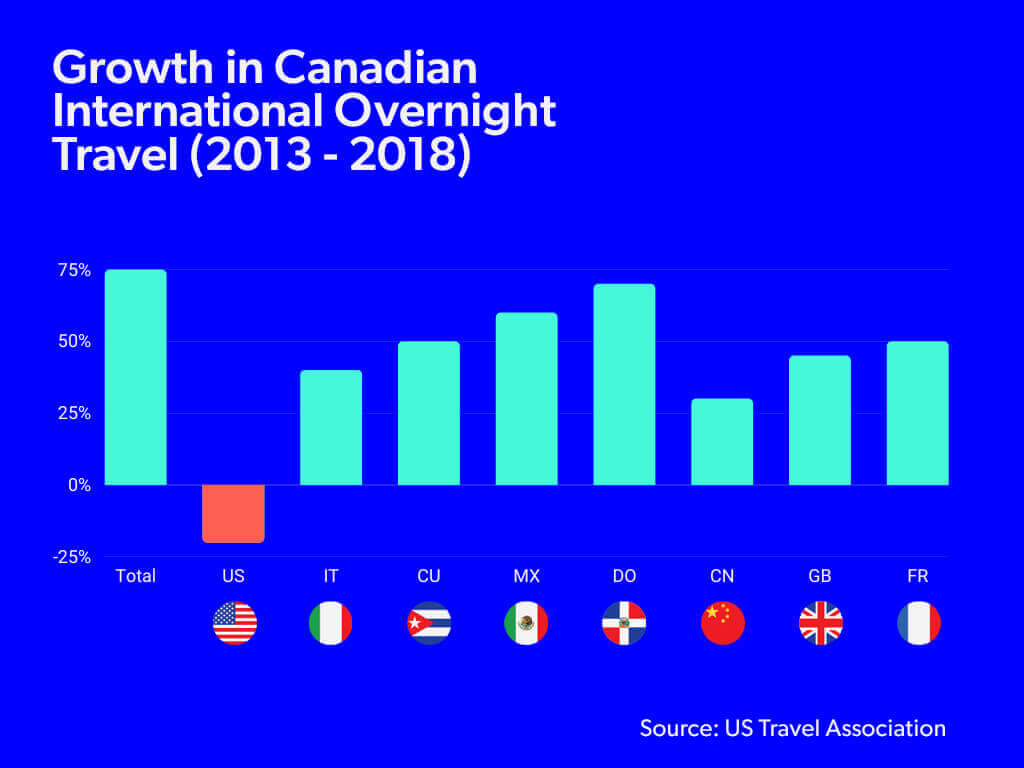6 Surprising Reasons Why Canadians Aren’t Flocking to the USA Anymore
July 24, 2023
Canada is the US’s biggest source of travel but the numbers are declining, especially by road.
In 2013 the US accounted for 64% of all Canadian international overnight travel. By March 2019 this number was down to 55%. This declining share contrasts with steady growth in Canadian international travel over the same period.
Canadians may not be travelling to the US but they are traveling internationally in greater numbers and more often. Travel to Italy for instance, has increased by 75% and Cuba by 29%. Even old stalwarts like the UK (+16%) and France (+11%) are seeing growth in their Canadian visitors.

So why is Canadian travel to the US declining?
1. Weakening Canadian dollar: The exchange rate between the Canadian dollar and the US dollar can significantly impact travel decisions. When the Canadian dollar is weak compared to the US dollar, it makes travel to the USA more expensive for Canadians. In recent years, the Canadian dollar has experienced periods of relative weakness, which can discourage Canadians from traveling to the USA.
2. Border security measures: In the aftermath of the 9/11 terrorist attacks, the USA implemented stricter border security measures. These measures include enhanced security screenings, increased documentation requirements, and longer wait times at the border. These factors can make travel to the USA more time-consuming and cumbersome for Canadians, potentially discouraging some from visiting.
3. Perception of unfriendly immigration policies: The perception of the USA’s immigration policies, particularly during certain periods, may deter Canadians from visiting. Changes in policies, including travel bans and restrictions on certain nationalities, have led to concerns and a perception that the USA is less welcoming to foreign visitors. This perception may influence Canadians’ decisions to choose other destinations over the USA.
4. Political climate and perception of safety: The political climate in the USA can also influence Canadians’ travel decisions. Some Canadians may have concerns about the political environment and societal tensions in the USA, leading them to opt for other travel destinations that they perceive as more stable or safer. While the Canadian government advises its citizens to “take normal security precautions” when visiting the US it also reminds Canadians that: “Incidences of mass shootings occur, resulting most often in casualties. Although tourists are rarely involved, there is a risk of being in the wrong place at the wrong time.”
5. Domestic attractions and travel alternatives: Canada itself offers a wide range of diverse and attractive destinations for Canadians to explore. From scenic landscapes to vibrant cities, Canadians may choose to explore their own country rather than traveling to the USA. Additionally, Canadians have access to other international destinations that may be more affordable or appealing based on personal preferences.
6. COVID-19 pandemic: As we’ve seen, Canadian travel to the US has been in decline since 2013. However, the pandemic has significantly impacted travel patterns worldwide with travel restrictions, lockdown measures, and health concerns all limiting international travel for Canadians, including visits to the USA. As leisure travel rebounds, tourists being more cautious.
The US is still Canada’s favourite international destination and spending by Canadian residents in the U.S. is ranked as the sixth biggest US export between the two countries. But where they visit and the way they visit is changing. There has been a marked decline in cross-border travel by car. In March 2019 Canadians accounted for 21.5 million overnight arrivals, roughly half of which arrived by air with the other half crossing a land border. In March 2023 the split was 68% by air 32% by land. This represented a 14% increase in the number of air travellers over March 2019 and the seventh consecutive month in which the number of air travellers exceeded pre-pandemic levels.
So, Canadians are travelling less often to the US but when they do travel they’re going further and staying for longer. This is great news for states like Florida, Nevada, California and Tennessee but not so good for the 13 states that share a border with Canada and rely more heavily on weekend getaways and short breaks.
Data from:
